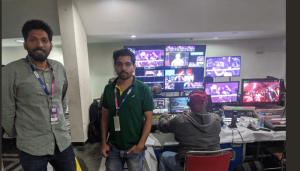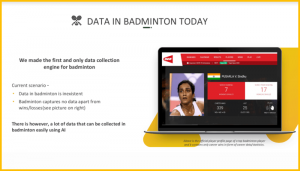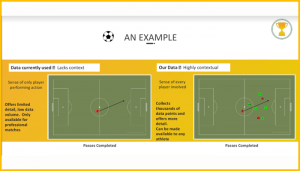With its first break at the Premier Badminton League, followed by an endorsement by Pullela Gopichand, this sports analytics startup is using data insights to evolve badminton and football for future generations. And it all started with research papers at the CVIT lab.
In early 2019, a research paper from IIITH’s Centre for Visual Information Technology (CVIT) found a willing candidate in a premier sports broadcasting station to test out its badminton analytics model. The paper proposed a method that could analyse badminton broadcast videos by tracking the players, annotating their strokes, generating heat maps to determine the dominant player and so on. It was during the live telecast of the semi-final match of the Premier Badminton League (PBL) that the broadcaster put the machine learning algorithm to use and relayed data in real time, thus enhancing the viewer experience.

Starting A Racquet
When this pilot study was rolled out, it was done under the banner of the newly-minted Product Labs, an initiative of the Technology Transfer Office to develop market-relevant prototypes out of the research from IIITH’s labs. “I really liked this idea – of translating research into products which could then be spun off into startups. Not many other universities have such a progressive thinking idea,” says Harshvardhan Kommana, the first employee of Product Labs. Harsha had just completed his MBA from Babson’s college, USA. “I was really interested in getting into the AI-tech space,” he narrates. His engineering plus MBA background made him a good fit for Product Labs and he was brought in as product manager. When Harsha joined, the badminton analytics research was the first to be identified as one with market potential. A few months later however, Ganesh Yaparla, a final year Masters student at IIITH approached Product Labs with a similar analytics model, but this time for football. Harsha, a former national-level tennis player himself, found his interest piqued and the duo decided to team up, founding Matchday.ai – a computer vision-driven solution for sports analytics.

Flight of the Birdie
At PBL, the data that was relayed live mainly implemented player location or the distance covered in terms of heat maps. However, another aspect of their solution deals with analysis of the type of shot played – data used to track players’ games to improve their own performance or to gain a competitive advantage over their opponents. One of the first breakthroughs they got for the latter was an interest evinced by badminton legend Pullela Gopichand for the training academy that he founded in 2008. The Gopichand Badminton Academy which has trained greats like Saina Nehwal, PV Sindhu, and Parupalli Kashyap among others, is looking at tapping into predictive analysis to optimise winning strategies for players.

The shift from a broadcasting solution to a coaching one necessitated a rejig in the technological architecture while keeping it computationally light at the same time. From an analysis of 5 shot categories like the smash, drop, forehand, backhand and the serve, the Gopichand academy wanted an in-depth analysis of over 30 categories. Thanks to the inputs of players like Kidambi Srikanth, the team gained a better understanding of on-the-ground requirements. After several iterations, they now boast of an end-to-end sophisticated solution that includes a fixed camera, the software infrastructure connecting to the camera and the processing unit which receives the video feed, right down to the statistics which appear on the mobile phones of coaches and players using it. With Gopichand himself vouching for the solution, the startup has received the much required boost. “This technology is definitely going to be useful for all kinds of badminton players,” says Gopichand.
Service, Point Lead
Badminton’s popularity in India has a long history and is the second most played sport after cricket. Initially played as a recreational garden activity, it owes its resurgence in recent years to players like Saina Nehwal, and PV Sindhu who put India on the global badminton map. Despite its widespread traction globally too, especially after its inclusion in the 1992 Olympics as an official sport, research in player performance hasn’t quite taken off. Matchday.ai is looking to tap into this segment with its machine learning techniques to track player statistics and identify successful strategies. While the badminton professional athletes market is small, with around a count of 200, football is in a totally different league. “The difference between football and badminton is that in the case of badminton, no analytics exist so far and no statistics are available. We’re trying to start slow here, provide the analytics and ramp up its adoption. In football, there are hundreds and thousands of clubs that play competitively and have budgets that run into millions in a year. Our football solution is geared towards much more professional athletes, to provide them with insights so that they can use it in a competitive manner,” says Harsha. The difference these startup founders aim to make in the football space is by automating the process of data collection. “Currently, it is a manual process and data annotation happens only for the player who is on the ball. Tracking only what he is doing without actually taking into account the rest of the 21 players is akin to a chess game where only the piece making the move is spotlighted ignoring the context provided by the entire chessboard,” explains Harsha.

The Best Shots
As fellows of the Entrepreneur-In-Residence (EIR) program at the Centre for Innovation and Entrepreneurship (CIE), Harsha and Ganesh count the office space they were given in addition to a monthly fixed fellowship, as a blessing. “We have really bootstrapped hard,” reveals Harsha. The two main sources of cash flow for the fledgling startup have been grants that they were eligible for through the government. In the first instance, the Ministry of Micro, Small and Medium Enterprises (MSME) offered a grant of about 15 lakhs for commercialization of ideas and prototyping. The other was a 7 lakh grant by TiDE for startups developing innovative digital solutions, and who are in the process of converting their proof of concept (PoC) to a minimum viable product (MVP). According to Harsha, both these grants came in handy especially during the first wave of the pandemic when they were facing a cash crunch. “We have now been able to expand our team; we have a couple of interns to assist the tech team and part-time staff that helps in annotation.”

Playing Smart
Acknowledging the advantage afforded to their startup by being physically present at the CIE, Harsha says, “Being associated with an institute like IIITH and the fact that our core technology is partly licensed from the Computer Vision lab backed by Prof. C V Jawahar no less, gives a huge weightage. When you’re talking with the Ministry, they certainly sit up and take notice. And of course, it helped that our first break came during PBL – again thanks to IIITH.” Currently the focus of the startup is on coaching academies for the pro athletes and the serious players who want to improve their own performance by keeping track of statistics. The idea is also to incorporate features like a leaderboard, an academy page with records of all matches played, listing of player statistics and the ability to share the information via social media. “With the social aspect built in, we’re planning on targeting the more casual player market,” says Harsha. Their long-term strategy is to enter the overseas market with solutions for international players “because that’s where the money is”. With its ethos being validated by the startup, Prakash Yalla, Head, Product Labs, says, “We’re happy that the technology from the labs is gaining traction in the market. We are beginning to see more and more sports looking for similar solutions, which is good.”


